雅思写作7分官方评分标准解析
- 格式:docx
- 大小:486.31 KB
- 文档页数:5
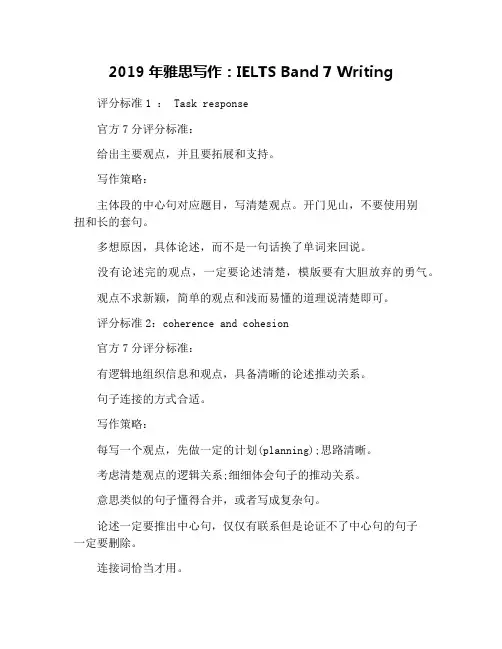
2019年雅思写作:IELTS Band 7 Writing 评分标准1 : Task response官方7分评分标准:给出主要观点,并且要拓展和支持。
写作策略:主体段的中心句对应题目,写清楚观点。
开门见山,不要使用别扭和长的套句。
多想原因,具体论述,而不是一句话换了单词来回说。
没有论述完的观点,一定要论述清楚,模版要有大胆放弃的勇气。
观点不求新颖,简单的观点和浅而易懂的道理说清楚即可。
评分标准2:coherence and cohesion官方7分评分标准:有逻辑地组织信息和观点,具备清晰的论述推动关系。
句子连接的方式合适。
写作策略:每写一个观点,先做一定的计划(planning);思路清晰。
考虑清楚观点的逻辑关系;细细体会句子的推动关系。
意思类似的句子懂得合并,或者写成复杂句。
论述一定要推出中心句,仅仅有联系但是论证不了中心句的句子一定要删除。
连接词恰当才用。
评分标准3:lexical resource官方7分评分标准:充分使用词汇,考虑灵活性和准确性。
能够使用一些不普通的词汇,知道恰当性和词伙。
写作策略:多记相关的词伙。
使用替换词要多注意词性和语境。
评分标准4:grammatical range and accuracy官方7分评分标准:用各种各样的复杂结构。
能够写出很多没有错误的句子。
写作策略:锻炼对语法错误的敏感。
要熟悉不同的从句,灵活使用,譬如说以“wh”词引导的名词性从句和定语从句的有效使用。
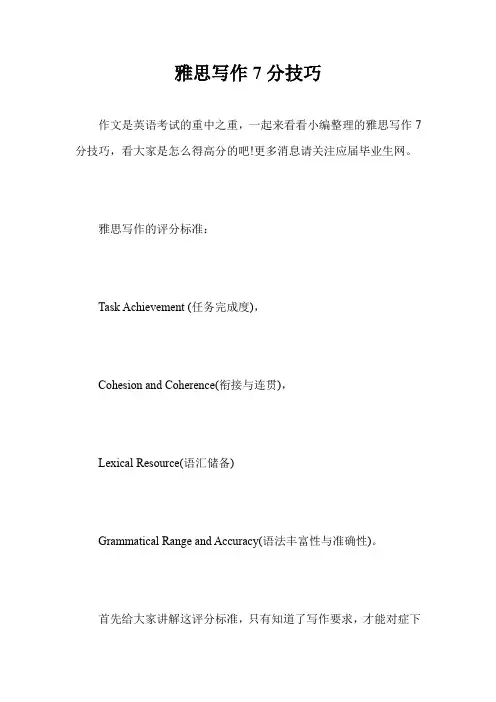
雅思写作7分技巧作文是英语考试的重中之重,一起来看看小编整理的雅思写作7分技巧,看大家是怎么得高分的吧!更多消息请关注应届毕业生网。
雅思写作的评分标准:Task Achievement (任务完成度),Cohesion and Coherence(衔接与连贯),Lexical Resource(语汇储备)Grammatical Range and Accuracy(语法丰富性与准确性)。
首先给大家讲解这评分标准,只有知道了写作要求,才能对症下药1.Task Achievement (任务完成度)——就是你是否覆盖了所有的写作要求雅思写作有大小两个写作任务(Task1和Task2),大家在写作之前一定要进行审题,其实雅思写作是很容易偏题或是审错题的!Task 1小作文大多数情况出的是常规的表图、线图、条形图,再就是出现频率不那么高的流程图了(话说一个月一次的频率),然后就是频率更低的地图题,还有一种就是物品比较题,这种很少会碰到。
它的要求很有可能是:“Summarise the information by selecting and reporting the main features, and make comparisons where relevant.”(选择并描述图表中的主要信息,并在必要之处进行比较。
)仔细读题的话,你会发现Task 1的写作要求一清二楚,共有三个部分:(1)“选择性的进行描述”,选择图表中的重要信息,你要记住无需所有的信息你都需要写出来。
所谓重要信息,一般是指极值、中间值、趋势(特别是从图表中总结出的趋势走向)等等。
例如一张饼状图中占比最大与最小的部分分别是什么、数值几何;一条折线总体上升或下降等等。
由于这个部分绝大多数的信息均为数字、百分比,所以要学会怎样用不同方式表达数字。
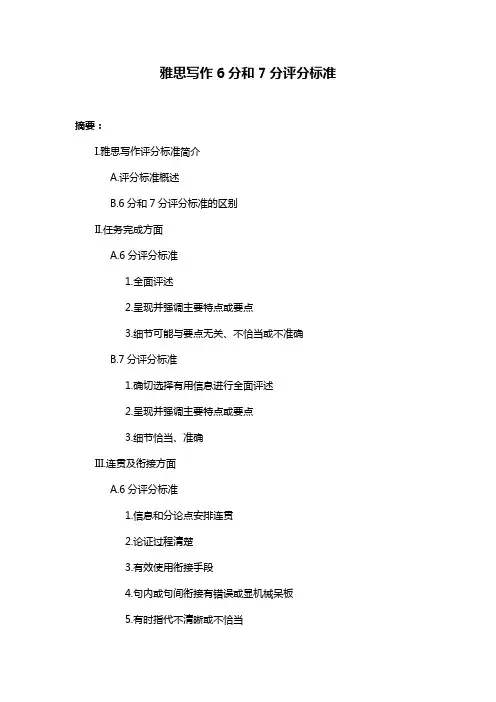
雅思写作6分和7分评分标准摘要:I.雅思写作评分标准简介A.评分标准概述B.6分和7分评分标准的区别II.任务完成方面A.6分评分标准1.全面评述2.呈现并强调主要特点或要点3.细节可能与要点无关、不恰当或不准确B.7分评分标准1.确切选择有用信息进行全面评述2.呈现并强调主要特点或要点3.细节恰当、准确III.连贯及衔接方面A.6分评分标准1.信息和分论点安排连贯2.论证过程清楚3.有效使用衔接手段4.句内或句间衔接有错误或显机械呆板5.有时指代不清晰或不恰当B.7分评分标准1.信息和分论点安排连贯2.论证过程清楚3.有效使用衔接手段4.句内或句间衔接准确、自然5.指代清晰、恰当IV.词汇量方面A.6分评分标准1.相对写作任务而言,所运用的词汇量充足2.尝试运用非常见词汇但有时出现错误3.拼写和构词出现一些错误,但不影响交流B.7分评分标准1.相对写作任务而言,所运用的词汇量充足2.熟练运用常见词汇和非常见词汇3.拼写和构词准确无误V.句式多样性及语法准确性方面A.6分评分标准1.句式多样性2.语法准确性3.可能存在一些语法错误,但不影响交流B.7分评分标准1.句式多样性2.语法准确性3.语法错误很少,不影响交流正文:雅思写作评分标准是衡量考生在雅思写作考试中表现的重要依据。
根据评分标准,写作分为四个方面:任务完成、连贯及衔接、词汇量和句式多样性及语法准确性。
每个方面的评分标准又分为6分和7分两个等级。
在任务完成方面,6分评分标准要求考生能全面评述,呈现并强调主要特点或要点,但细节可能与要点无关、不恰当或不准确。
而7分评分标准则要求考生确切选择有用信息进行全面评述,呈现并强调主要特点或要点,且细节恰当、准确。
在连贯及衔接方面,6分评分标准要求信息和分论点安排连贯,论证过程清楚,有效使用衔接手段,但句内或句间衔接有错误或显机械呆板,有时指代不清晰或不恰当。
7分评分标准则要求信息和分论点安排连贯,论证过程清楚,有效使用衔接手段,句内或句间衔接准确、自然,指代清晰、恰当。
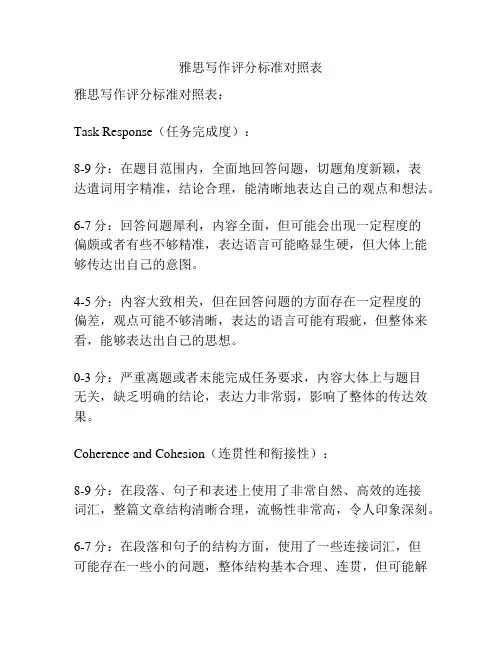
雅思写作评分标准对照表雅思写作评分标准对照表:Task Response(任务完成度):8-9分:在题目范围内,全面地回答问题,切题角度新颖,表达遣词用字精准,结论合理,能清晰地表达自己的观点和想法。
6-7分:回答问题犀利,内容全面,但可能会出现一定程度的偏颇或者有些不够精准,表达语言可能略显生硬,但大体上能够传达出自己的意图。
4-5分:内容大致相关,但在回答问题的方面存在一定程度的偏差,观点可能不够清晰,表达的语言可能有瑕疵,但整体来看,能够表达出自己的思想。
0-3分:严重离题或者未能完成任务要求,内容大体上与题目无关,缺乏明确的结论,表达力非常弱,影响了整体的传达效果。
Coherence and Cohesion(连贯性和衔接性):8-9分:在段落、句子和表述上使用了非常自然、高效的连接词汇,整篇文章结构清晰合理,流畅性非常高,令人印象深刻。
6-7分:在段落和句子的结构方面,使用了一些连接词汇,但可能存在一些小的问题,整体结构基本合理、连贯,但可能解读上有一定困难。
4-5分:在文章结构的组织上出现了不够自然或者较明显的错误,段落和句子的表述相对独立,衔接性欠缺、有些老套。
0-3分:在文章结构上有严重的问题,段落和句子之间缺乏任何的衔接性,无法为读者带来清晰、连贯的思路。
Lexical Resource(词汇运用):8-9分:用词丰富且准确,能够运用大量高难度的词汇,且在使用上非常自然流利,表达的深度、广度均能与话题相关内容相适应。
6-7分:用词恰当,词汇量能够支持表达所需的深度和广度,但并没有使用过多的高难度词汇。
4-5分:用词基本准确,但表达上可能显得有些平庸,缺少个性化和深度化的特点。
0-3分:用词不准确,表达上过于单一,缺乏纵深和广度。
Grammatical Range and Accuracy(语法运用):8-9分:在语法的使用上准确无误,能够灵活运用各种语法结构,表现出高级别的语法能力。
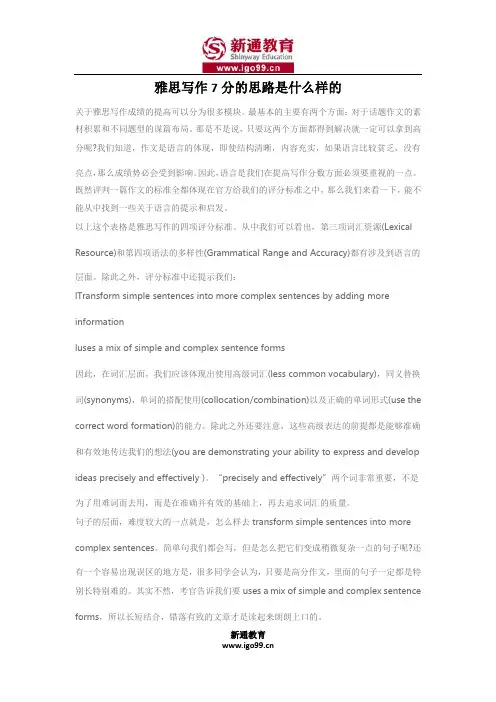
雅思写作7分的思路是什么样的关于雅思写作成绩的提高可以分为很多模块。
最基本的主要有两个方面:对于话题作文的素材积累和不同题型的谋篇布局。
那是不是说,只要这两个方面都得到解决就一定可以拿到高分呢?我们知道,作文是语言的体现,即使结构清晰,内容充实,如果语言比较贫乏,没有亮点,那么成绩势必会受到影响。
因此,语言是我们在提高写作分数方面必须要重视的一点。
既然评判一篇作文的标准全都体现在官方给我们的评分标准之中,那么我们来看一下,能不能从中找到一些关于语言的提示和启发。
以上这个表格是雅思写作的四项评分标准。
从中我们可以看出,第三项词汇资源(Lexical Resource)和第四项语法的多样性(Grammatical Range and Accuracy)都有涉及到语言的层面。
除此之外,评分标准中还提示我们:lTransform simple sentences into more complex sentences by adding more informationluses a mix of simple and complex sentence forms因此,在词汇层面,我们应该体现出使用高级词汇(less common vocabulary),同义替换词(synonyms),单词的搭配使用(collocation/combination)以及正确的单词形式(use the correct word formation)的能力。
除此之外还要注意,这些高级表达的前提都是能够准确和有效地传达我们的想法(you are demonstrating your ability to express and develop ideas precisely and effectively )。
“precisely and effectively”两个词非常重要,不是为了用难词而去用,而是在准确并有效的基础上,再去追求词汇的质量。
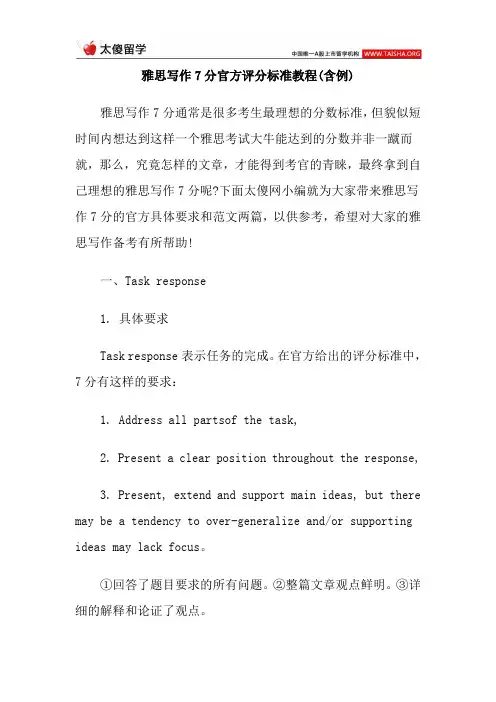
雅思写作7分官方评分标准教程(含例)雅思写作7分通常是很多考生最理想的分数标准,但貌似短时间内想达到这样一个雅思考试大牛能达到的分数并非一蹴而就,那么,究竟怎样的文章,才能得到考官的青睐,最终拿到自己理想的雅思写作7分呢?下面太傻网小编就为大家带来雅思写作7分的官方具体要求和范文两篇,以供参考,希望对大家的雅思写作备考有所帮助!一、Task response1. 具体要求Task response表示任务的完成。
在官方给出的评分标准中,7分有这样的要求:1. Address all partsof the task,2. Present a clear position throughout the response,3. Present, extend and support main ideas, but there may be a tendency to over-generalize and/or supporting ideas may lack focus。
①回答了题目要求的所有问题。
②整篇文章观点鲜明。
③详细的解释和论证了观点。
二、Coherence andcohesion1. 具体要求Coherence and cohesion表示连贯统一。
在官方给出的评分标准中,7分有这样的要求:1. Logically organizes information and ideas; there isa clear progression throughout2. Uses a range of cohesive devices appropriately although there may be some under/over-use3. Presents a clear central topic within each paragraph①文章结构富有逻辑性。
②正确使用多种衔接方法。
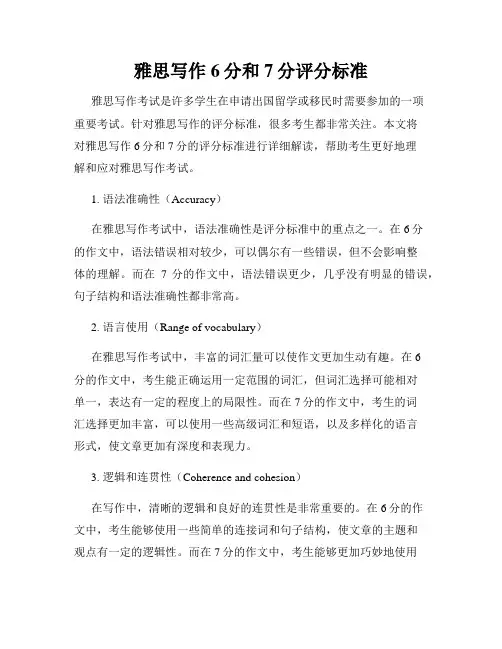
雅思写作6分和7分评分标准雅思写作考试是许多学生在申请出国留学或移民时需要参加的一项重要考试。
针对雅思写作的评分标准,很多考生都非常关注。
本文将对雅思写作6分和7分的评分标准进行详细解读,帮助考生更好地理解和应对雅思写作考试。
1. 语法准确性(Accuracy)在雅思写作考试中,语法准确性是评分标准中的重点之一。
在6分的作文中,语法错误相对较少,可以偶尔有一些错误,但不会影响整体的理解。
而在7分的作文中,语法错误更少,几乎没有明显的错误,句子结构和语法准确性都非常高。
2. 语言使用(Range of vocabulary)在雅思写作考试中,丰富的词汇量可以使作文更加生动有趣。
在6分的作文中,考生能正确运用一定范围的词汇,但词汇选择可能相对单一,表达有一定的程度上的局限性。
而在7分的作文中,考生的词汇选择更加丰富,可以使用一些高级词汇和短语,以及多样化的语言形式,使文章更加有深度和表现力。
3. 逻辑和连贯性(Coherence and cohesion)在写作中,清晰的逻辑和良好的连贯性是非常重要的。
在6分的作文中,考生能够使用一些简单的连接词和句子结构,使文章的主题和观点有一定的逻辑性。
而在7分的作文中,考生能够更加巧妙地使用连接词和句子结构,使文章各个部分之间的转折和衔接更加自然流畅,使整篇文章更具一致性和连贯性。
4. 文章结构和组织(Task achievement)在雅思写作中,考生需要根据题目要求进行合理的文体和结构安排。
在6分的作文中,考生能够较好地满足考题的基本要求,文章结构清晰,但可能存在一些组织上的不足。
而在7分的作文中,考生能够更好地组织和安排文章结构,将重点观点有条理地呈现,使文章的逻辑性和连贯性更加突出。
综上所述,雅思写作6分和7分的评分标准主要包括语法准确性、语言使用的丰富程度、文章逻辑和连贯性以及文章结构和组织能力等方面。
考生在备考过程中,应注重提高语法准确性、拓展词汇量、训练逻辑思维和组织能力,在实际写作中注意合理使用语言表达和句子结构,使作文更富有表现力和深度。
![[雅思写作攻略:雅思写作7分标准]雅思写作6分标准](https://uimg.taocdn.com/9961716e84868762caaed5fa.webp)
[雅思写作攻略:雅思写作7分标准]雅思写作6分标准雅思写作攻略:雅思写作7分标准雅思写作攻略:雅思写作7分标准以下是雅思写作的7分标准(a). coherence and cohesion logically organises information and ideas, there is clear progression throughout lises a range of cohesive devices appropriately although there may be some under-or over use presents a clear topic within each paragragh 用中文最简单的意思是:分段分点,每点之前必须有连接词。
这一点非常非常容易达到(我总结了大量这样的词汇,明天或者后天上传上来)。
然后那个考官最为推介的范式(以argumentation的题目为例,因为report类的文章更死板了):开头段+主体段(让步一段,支持(反对)两段)+结尾段。
其实说白了,就是我们最熟悉不过的模版。
(b). task response: addresses all parts of the task presents a clear position throughout the reponse presents, extend and supports main ideas, but there may be a tendency to over-generalise and/or supporting ideas may lack focus. 用中文最简单的理解是:首尾都要回答问题,允许泛泛而谈。
这就是说,我们没必要花太多的精力去考虑观点是否绝对严谨是否意义深刻,关键是要告诉考官你的思考逻辑。
这就是剑桥雅思的魅力,它要考你的不是你的思维能力,而是你的语言表达能力。
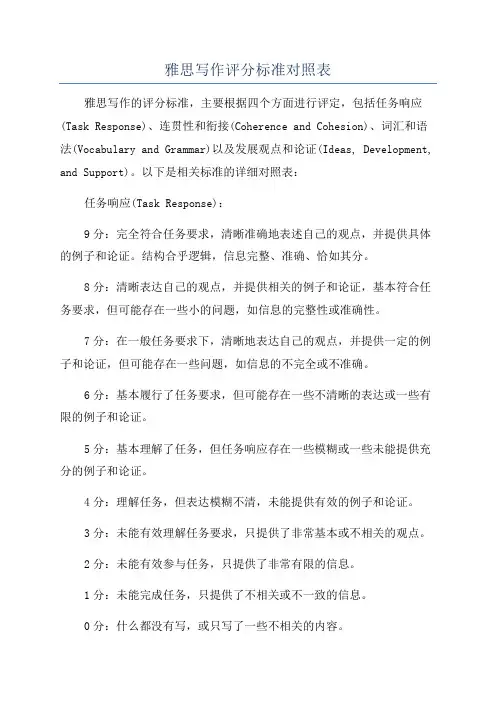
雅思写作评分标准对照表雅思写作的评分标准,主要根据四个方面进行评定,包括任务响应(Task Response)、连贯性和衔接(Coherence and Cohesion)、词汇和语法(Vocabulary and Grammar)以及发展观点和论证(Ideas, Development, and Support)。
以下是相关标准的详细对照表:任务响应(Task Response):9分:完全符合任务要求,清晰准确地表述自己的观点,并提供具体的例子和论证。
结构合乎逻辑,信息完整、准确、恰如其分。
8分:清晰表达自己的观点,并提供相关的例子和论证,基本符合任务要求,但可能存在一些小的问题,如信息的完整性或准确性。
7分:在一般任务要求下,清晰地表达自己的观点,并提供一定的例子和论证,但可能存在一些问题,如信息的不完全或不准确。
6分:基本履行了任务要求,但可能存在一些不清晰的表达或一些有限的例子和论证。
5分:基本理解了任务,但任务响应存在一些模糊或一些未能提供充分的例子和论证。
4分:理解任务,但表达模糊不清,未能提供有效的例子和论证。
3分:未能有效理解任务要求,只提供了非常基本或不相关的观点。
2分:未能有效参与任务,只提供了非常有限的信息。
1分:未能完成任务,只提供了不相关或不一致的信息。
0分:什么都没有写,或只写了一些不相关的内容。
连贯性和衔接(Coherence and Cohesion):9分:文章结构清晰,段落之间的衔接自然流畅,使用了适当的链接词和短语,使文章整体连贯。
8分:文章结构清晰,段落之间的衔接自然流畅,使用了一些适当的链接词和短语,使文章整体连贯,但可能存在一些不连贯之处。
7分:文章结构基本清晰,段落之间存在一些连贯性问题,但整体上看仍然能够理解。
6分:文章结构基本清晰,但段落之间缺乏明显的衔接,表达不够连贯。
5分:文章结构不太清晰,段落之间缺乏明确的衔接,表达不连贯。
4分:文章结构不清晰,段落之间缺乏明确的衔接,表达不连贯。
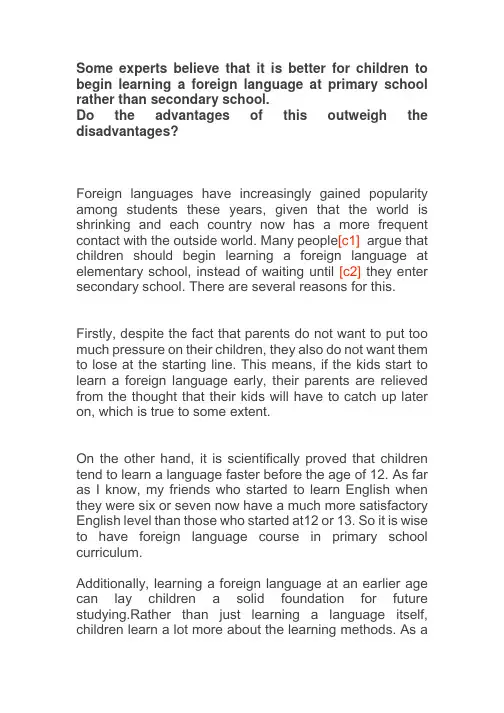
Some experts believe that it is better for children to begin learning a foreign language at primary school rather than secondary school.Do the advantages of this outweigh the disadvantages?Foreign languages have increasingly gained popularity among students these years, given that the world is shrinking and each country now has a more frequent contact with the outside world. Many people[c1] argue that children should begin learning a foreign language at elementary school, instead of waiting until [c2] they enter secondary school. There are several reasons for this.Firstly, despite the fact that parents do not want to put too much pressure on their children, they also do not want them to lose at the starting line. This means, if the kids start to learn a foreign language early, their parents are relieved from the thought that their kids will have to catch up later on, which is true to some extent.On the other hand, it is scientifically proved that children tend to learn a language faster before the age of 12. As far as I know, my friends who started to learn English when they were six or seven now have a much more satisfactory English level than those who started at12 or 13. So it is wise to have foreign language course in primary school curriculum.Additionally, learning a foreign language at an earlier age can lay children a solid foundation for future studying.Rather than just learning a language itself, children learn a lot more about the learning methods. As aresult, when they enter secondary school, they can explore more languages and enrich their knowledge by extensive readings.The only disadvantage of learning a foreign language at primary school might be one more course and pressure. However,primary schools can introduce advanced teaching methods to tackle this problem,such as playing games and role play, and ensure that children can enjoy the language learning process.In conclusion, the advantages of learning foreign languages at primary school rather than secondary school outweigh the disadvantages.注释:[c1]people 和expert是有区别的,注意看题目指的是哪类人[c2]tilTotal: (6.5+6.5+7+7.5)/4=7分Task response 6.5 分1. address all parts of the task 7分首先列举的advantages,然后提出disadvantage,紧接着驳斥了这个disadvantage。
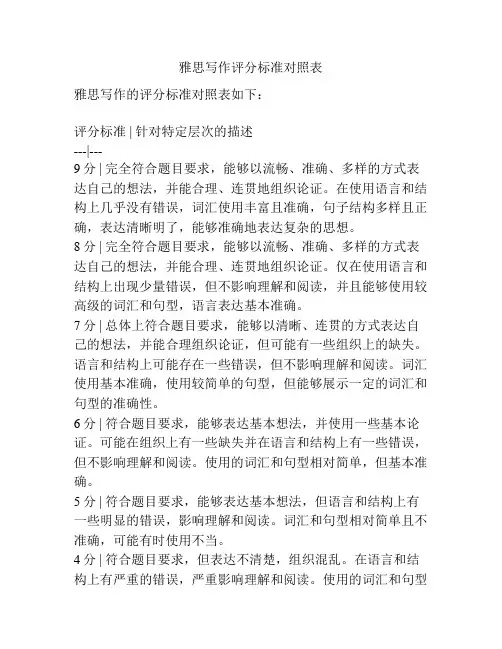
雅思写作评分标准对照表雅思写作的评分标准对照表如下:评分标准 | 针对特定层次的描述---|---9分 | 完全符合题目要求,能够以流畅、准确、多样的方式表达自己的想法,并能合理、连贯地组织论证。
在使用语言和结构上几乎没有错误,词汇使用丰富且准确,句子结构多样且正确,表达清晰明了,能够准确地表达复杂的思想。
8分 | 完全符合题目要求,能够以流畅、准确、多样的方式表达自己的想法,并能合理、连贯地组织论证。
仅在使用语言和结构上出现少量错误,但不影响理解和阅读,并且能够使用较高级的词汇和句型,语言表达基本准确。
7分 | 总体上符合题目要求,能够以清晰、连贯的方式表达自己的想法,并能合理组织论证,但可能有一些组织上的缺失。
语言和结构上可能存在一些错误,但不影响理解和阅读。
词汇使用基本准确,使用较简单的句型,但能够展示一定的词汇和句型的准确性。
6分 | 符合题目要求,能够表达基本想法,并使用一些基本论证。
可能在组织上有一些缺失并在语言和结构上有一些错误,但不影响理解和阅读。
使用的词汇和句型相对简单,但基本准确。
5分 | 符合题目要求,能够表达基本想法,但语言和结构上有一些明显的错误,影响理解和阅读。
词汇和句型相对简单且不准确,可能有时使用不当。
4分 | 符合题目要求,但表达不清楚,组织混乱。
在语言和结构上有严重的错误,严重影响理解和阅读。
使用的词汇和句型非常简单且错误频繁。
3分 | 没有完全满足题目要求,表达不清楚,组织混乱。
语言和结构上存在严重和频繁的错误,导致无法理解和阅读。
词汇、句型使用不当,基本无法准确表达意思。
2分 | 没有满足题目要求,几乎无法表达任何想法。
严重的语言和结构错误,无法理解和阅读。
使用的词汇和句型非常有限且基本错误。
1分 | 未能满足题目要求,无法表达任何内容。
严重的语言和结构错误,完全无法理解和阅读。
几乎没有使用有效的词汇和句型。
0分 | 未能提供任何可评价的写作,无法判断成绩。
雅思作文7评分标准雅思作文7评分标准一提到写作,很多同学都觉得很难,不知道怎么写,不知道写什么,写出来东西拿不到高分。
就国内写作分数来说,从下半年开始,一直走低,大多数考生只能取得5.5,6分的成绩都很少,7分以上就更是少之又少了。
究其原因,不难发现,考官更严格地遵守了评分标准,对于各项的评分都严上加严。
建议同学们一定要透彻地理解雅思写作的评分标准,从中找出取得写作高分的金钥匙。
对于评分标准,大家一定要仔细琢磨,只要静下心来好好领悟,再通过一定量的练习来提升自己全方位的能力,才能获得满意的成绩。
不要心存幸运,写作也没有捷径。
Task One:1:task achievement2: coherence and cohesion3: Lexical Resource4: Grammatical Range and AuracyTask Two:1: Task Response2: Coherence and Cohesion3: Lexical Resource4: Grammatical Range and AuracyTA为task achievement针对小作文而言, TR为task response,是对大作文而言的,统称为任务完成,指的是写作的审题,文章布局,论证充分性和观点的深度,数据选择与比拟等。
CC 指的是coherence & cohesion,写作的统一性,即前后照应和文章的连贯性以及流畅程度。
LR指的是lexical resource,词汇的变化和词汇的使用频率。
GRA为grammatical range and auracy, 意指句式的变化和准确使用的程度。
这些内容分别对应雅思考试作文答题纸上的examiner's use only 里的 TA,CC,LR,GRA,TR 不难看出,Task 1和Task 2的评分标准只有第一条(任务完成情况)不同,由于Task 1考查的是图表作文,所以要比Task 2少一项任务,就是不需要有作者的立场(Position)。
雅思7分作文评分标准雅思7分作文评分标准雅思考试中,作文是非常重要的一个体型,下面雅思为大家整理了详解雅思写作大作文的评分标准,供考生们参考,以下是详细内容。
雅思作文考试要求Task 1要求考生在20分钟内完成150字以上的文章。
G类要求考生针对题目要求写一封信来询问某方面信息或阐释某种状况。
到目前为止,出现较多的书信种类有投诉信、请求信、建议信、寻找失物信、邀请信等。
而A类则考核图表为主。
考得较多的有曲线图、柱状图、饼状图、表格等。
也有可能考到两种不同种类的图。
另外,流程图和示意图也偶尔考到。
Task 2 要求考生在40分钟内写作一篇不少于250字的议论文。
A 类和G类在Task 2方面非常相似。
考生可能需要对某个观点发表支持或反驳意见,或者讨论针锋相对的一组观点,或者解释某种问题出现的原因并提出相应的.解决办。
雅思评分按9分制。
基本上,移民或读语言学校起码要5分。
留学需要6分以上。
如果读的是法律、传媒、管理等名校的研究生的话,写作最好达到7分。
但考生最后写作成绩并不是Task 1和Task 2的简单平均,而是以Task 2为主。
雅思7分作文评分标准作文没有半分,最小分单位为1.0。
6分:文章切题,语句通顺,没有明显错误,有一些比较不错的语句就是6分的标准了。
6分句子范例:Things should be done to make salaries fairer. Huge amounts of money shall be given to more deserving people. It seems that the only solution is to impose heavy taxes upon people who earn excessively high salaries.7分:文笔流畅,错误极少,有个别闪光点就是7分。
7分句子范例:Bad traffic and increasing pollution are thorny issues challenging every major city in the globe. To combat such problems, government encourages companies to mark up gas price in an effort to decrease car use and cut down waste gas. However it may temporarily alleviate the problem, but is doubtfully the optimal solution.8分论点新颖、别具一格,或者文风极富个性,与众不同。
Some experts believe that it is better for children to begin learning a foreign language at primary school rather than secondary school.
Do the advantages of this outweigh the disadvantages? Foreign languages have increasingly gained popularity among students these years, given that the world is shrinking and each country now has a more frequent contact with the outside world. Many people[c1]argue that children should begin learning a foreign language at elementary school, instead of waiting until [c2] they enter secondary school. There are several reasons for this.
Firstly, despite the fact that parents do not want to put too much pressure on their children, they also do not want them to lose at the starting line. This means, if the kids start to learn a foreign language early, their parents are relieved from the thought that their kids will have to catch up later on, which is true to some extent.
On the other hand, it is scientifically proved that children tend to learn a language faster before the age of 12. As far as I know, my friends who started to learn English when they were six or seven now have a much more satisfactory English level than those who started at12 or 13. So it is wise to have foreign language course in primary school curriculum.
Additionally, learning a foreign language at an earlier age can lay children a solid foundation for future studying.Rather than just learning a language itself, children learn a lot more about the learning methods. As a result, when they enter secondary school, they can explore more languages and enrich their knowledge by extensive readings.
The only disadvantage of learning a foreign language at primary school might be one more course and pressure. However,primary schools can introduce advanced teaching methods to tackle this problem,such as playing games and role play, and ensure that children can enjoy the language learning process.
In conclusion, the advantages of learning foreign languages at primary school rather than secondary school outweigh the disadvantages.
注释:
[c1]people 和expert是有区别的,注意看题目指的是哪类人[c2]til
Total: (6.5+6.5+7+7.5)/4=7分
Task response 6.5 分
1. address all parts of the task 7分
首先列举的advantages,然后提出disadvantage,紧接着驳斥了这个disadvantage。
这一步证明了你都懂题目不仅是要让列举利弊还要做出比较
2. present a clear position throughout theresponse. 7分
主体赞成利大于弊,并在说弊的时候有力的反驳了,最后一段明确提出自己的立场。
3. main ideas may be unclear 6分
需要改进的段落
主体第一段你写的是家长觉得孩子不能输在起跑线,但是题目里面说的是专家提出这个观点,把家长和专家混在一起,混淆了题目观点的出发角度。
这里要扣分。
需要保持的段落
主体第二段用你朋友的经历做例子完全可以!只要支持你的论点就行
主体第三段学习一门外语的方法可以应用到其他语言学习上,确实!能看到不同语言的内在联系,很不错!
主体第四段驳斥反方观点并提出一些解决方法
4. conclusions may become repetitive 6分
不要在结论里面把题目照搬一遍
Coherence and cohesion 6.5 分
1. logically organize information and ideas7分
2. present a clear central topic in each paragragh 7分
我个人比较支持一个段一个点这样能保持段落长度一致同时表意清晰
3. may use cohesive devices mechanically 6分
看下你的主体段落的开头,一下firstly 一下on the other hand 一下additionally 这几个连接词属于不同类别建议使用同类连词,如果是firstly 那后面就用secondly thirdly,如果是要用on the other hand, 前面搭配使用on the one hand。
否则给读者的印象是你学过连词但是不太会用。
4. 另外代词的使用不错,this, it, they 都能正确使用
Lexical resources 7分
1 use a wide range of vocabulary and allowsome flexibility
and precision
首段的对题目的paraphrase做的相当不错!
但是末尾段基本属于照抄题目了,很可能不算在字数里面。
建议你学习一下结尾段的写法。
定冠词和不定冠词的使用很好
活用动词learn learning teach teaching
形容词副词能正确使用
2. use less common vocabulary well
popularity foundation curriculum satisfactory extensive
3. use of collocation
Lay a solid foundation, language learning process, advanced teaching method, extensive readings.
Grammar 7.5分
1 use a wide range of structures.
简单句即符合基本主谓宾结构
There are several reasons for this.
宾语从句第一段many people argue that xxx第三段it is scientifically proved that xxx
长句第二段despite of xxx, xxx/ 第四段rather than xxx, xxx 第五段第二句话用and连接的两个句子中间还有插入语such as xxx
时间状语从句第三段my friends who xxxx when they were xxx 第四段when they enter xxx
2 the majority of sentences are error free
3 make occasional mistakes
第四段Rather than learn a language itself 记得要和后半句的动词形态一致,后面已经是原形learn了,用rather than就得用原形。